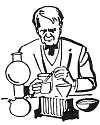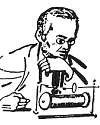 Now, here is what happened. After Faraday,
came Morse and Bell,
who used the idea as a means of communication - the telegraph and the
telephone. Edison made the idea
glow and lit up the world. Marconi
and
deForest went Morse and Bell
one better and laid the foundation for
radio.
Now, here is what happened. After Faraday,
came Morse and Bell,
who used the idea as a means of communication - the telegraph and the
telephone. Edison made the idea
glow and lit up the world. Marconi
and
deForest went Morse and Bell
one better and laid the foundation for
radio. But here is the point - for over 2,500 years, that electrical thought
had been growing. It had been carefully cultivated and expanded by
a few straight-thinking men - a Greek, an Englishman, a
German, a Dane, an American and an Italian. Often these men were
working at the same time, unknown to each other. And this small,
apparently unimportant idea in the year 600 B.C. has grown until it has
literally changed the face of the earth and the habits of its people.
But here is the point - for over 2,500 years, that electrical thought
had been growing. It had been carefully cultivated and expanded by
a few straight-thinking men - a Greek, an Englishman, a
German, a Dane, an American and an Italian. Often these men were
working at the same time, unknown to each other. And this small,
apparently unimportant idea in the year 600 B.C. has grown until it has
literally changed the face of the earth and the habits of its people.Here is an interesting thing about intangible ideas like this one. Once they occur, they are indestructible. Wars, plagues and persecutions may drive them out of sight for a while but they always spring back again perhaps in another man's brain, perhaps in some other part of the world, to be cultivated and enlarged. And I cannot feel but sometime there will be another mentality similar to Schubert's that will catch the same theme that he had, and write the finishing part of that great symphony. |








